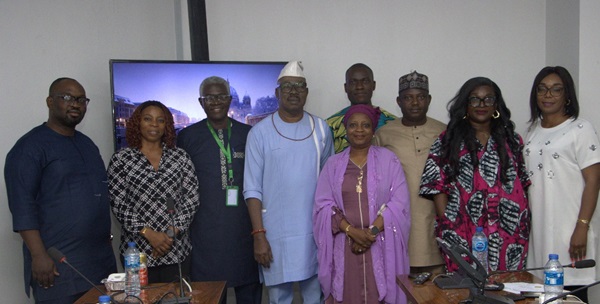
Stakeholders in Nigeria’s biotechnology and biosafety sector have honoured the immense contributions of the late Prof. Diran Makinde to the development of biotechnology and biosafety in the country.
Delivering a keynote address during a hybrid memorial lecture organised by the Rufus Ebegba Centre for Leadership and Environmental Sustainability (RECLES) in collaboration with the African Agricultural Technology Foundation (AATF) in Abuja, the executive director of RECLES, Dr. Rufus Ebegba described Makinde as a “pragmatic man who played a significant role in advancing national biosafety systems across Africa.”
Ebegba noted that Makinde was deeply committed to science, technology and innovation as drivers of economic growth and social development on the continent. His dedication to establishing holistic biosafety systems in Africa, he said, was evident in his impactful work.
“Prof. Makinde was passionate about using science to improve the lives of Africans practically and strategically. He was a deep thinker, highly innovative and exceptionally creative. He contributed immensely to the development of AU-DA and generously shared his expertise, experience and knowledge with the African Union and the continent at large. Throughout his career, he worked with integrity, energy and passion. As we remember his passing, we truly miss an incredibly vibrant individual – someone whose warmth and presence lit up every room,” Ebegba stated.
He described Makinde as a staunch advocate for science, technology and innovation (STI) in Africa, a strong supporter of the African Union High-Level African Panel on Emerging Technologies and a courageous scholar who championed biotechnology for Africa’s progress. He noted that Makinde fearlessly opposed deep ecology and anti-technology movements and played a leading role in the NEPAD-ABNE initiative for the continent.
AATF’s regional representative for West Africa, Dr. Jean Baptiste also lauded Makinde’s contributions to biosafety regulation across Africa. He emphasised that Makinde was instrumental in entrenching comprehensive biosafety measures, creating an environment where scientific innovation and biotechnology could flourish for economic growth and agricultural advancement.
In his goodwill message, the director-general of the National Biotechnology Research and Development Agency (NBRDA), Prof. Abdullahi Mustapha reflected on Makinde’s longstanding collaboration with the agency in promoting biotechnology and biosafety across Africa, particularly in West Africa and Nigeria.
Represented by the director of the agricultural biotechnology department, Dr. Rose Gidado, Mustapha described Makinde as a beacon of inspiration whose expertise and dedication left a lasting impact on the sector.
“During his tenure as director of the African Biosafety Network of Expertise (ABNE), he played a crucial role in building capacity, raising public awareness and fostering collaboration among African nations in the field of modern biotechnology and biosafety. His work helped shape policies and strengthen regulatory frameworks across the continent,” Mustapha said.
“As we gather to honour him, we reaffirm our commitment to continuing his legacy and advancing biotechnology and biosafety in Africa. Our thoughts and prayers remain with his family and loved ones. May his impact continue to inspire and drive progress,” he added.
Similarly, the director-general of the National Biosafety Management Agency (NBMA), Dr. Agnes Asagbra described Makinde as a visionary leader who recognised the essential role of biosafety in Africa’s sustainable development.
She noted that his unwavering dedication to establishing robust biosafety systems provided a strong foundation for the responsible application of biotechnology to address key challenges such as food security and environmental sustainability.
Represented by NBMA principal scientific officer, Mr. Abisabo Adamu, Asagbra highlighted Makinde’s instrumental role in capacity building, knowledge sharing and harmonising biosafety regulations across African nations.
“His efforts ensured that Africa remained engaged in global biotechnology discussions while safeguarding its unique biodiversity and ecosystems. As we reflect on his contributions today, let us honour his memory by strengthening biosafety frameworks, fostering regional collaboration and ensuring equitable access to biotechnology benefits while minimising potential risks,” she stated.
The head of ABNE, Prof. Jeremy Ouedraogo who succeeded Makinde, emphasised the strong foundation his predecessor laid for advancing biosafety initiatives in West Africa.
“We are deeply saddened by his passing, but we will not stay silent in celebrating his legacy. We take immense pride in his contributions to biotechnology in Africa. He lived and died with an unwavering passion for promoting biotechnology, and his commitment to the sector will be greatly missed by colleagues, friends and the scientific community,” Ouedraogo stated.
Nigeria’s country coordinator for the programme for biosafety systems (PBS), Dr. Matthew Dore described Makinde as a rare gem and a highly open-minded individual.
“In my experience, he was very approachable and always found a way to integrate biosafety into discussions. As a Nigerian, he actively sought opportunities to advance biosafety at every turn,” Dore noted.
“At international forums, he played a key role in ensuring that all organizations working with AUDA-NEPAD had ample opportunities for collaboration and coordination. His efforts were crucial in mobilizing resources and ensuring the seamless execution of projects across various platforms. His absence leaves a void that will be difficult to fill, but his legacy will continue to be celebrated by the biosafety and biotechnology community,” he added.
Responding on behalf of the Makinde family, his daughter, Prof. Olamide Makinde, expressed deep appreciation for the tributes paid to her late father.
“I am touched to see how my father’s life and work have made such a meaningful impact. I know how passionate he was about biosafety and Africa’s development. His heart was always with the African people and he strongly believed in sustainable growth for the continent,” she stated.
Visibly emotional, she thanked the event organisers and stakeholders for honouring her father’s memory with the memorial lecture.
Makinde’s legacy remains a guiding light in the advancement of biotechnology and biosafety, as stakeholders continue to build on his pioneering work to drive scientific innovation and sustainable development in Africa.


